Τεκμήρια από Κέντρον Ερεύνης Ελληνικής Φιλοσοφίας
<< 10
10 >>
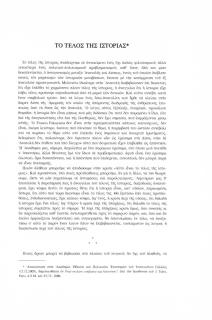
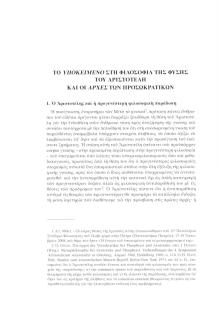
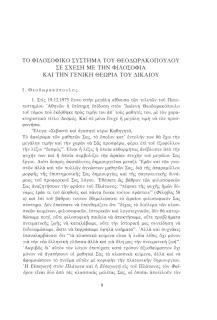
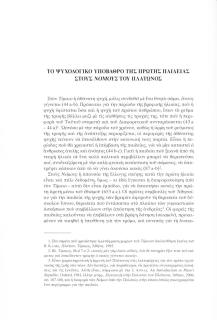
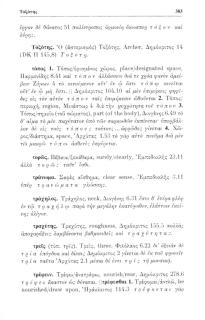
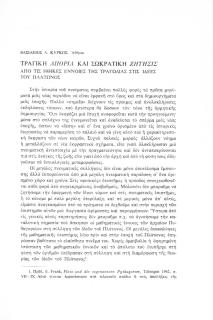
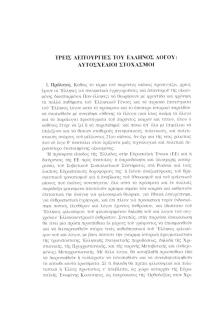
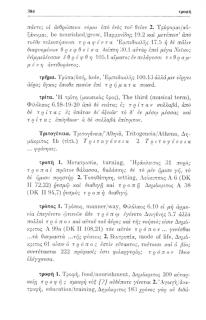
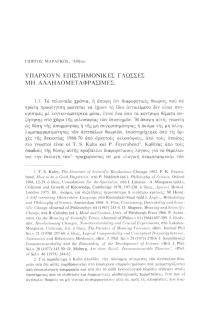
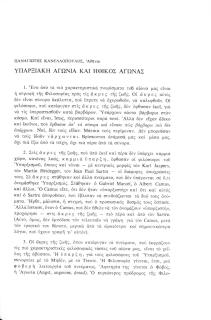
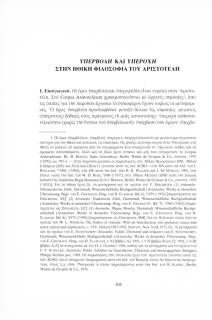
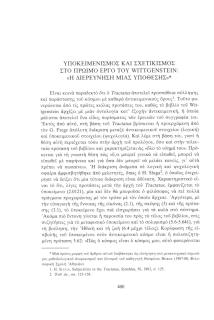 << 10
10 >>
<< 10
10 >>
Σύνολο: 4244

Το τέλος της Ιστορίας
Ενότητα: Άρθρα του περιοδικού "Φιλοσοφία"
Δεν υπάρχει περιγραφή
Το υποκείμενο στη Φιλοσοφία της φύσης του Αριστοτέλη και οι αρχές των Προσωκρατικών
Ενότητα: Άρθρα του περιοδικού "Φιλοσοφία"
Hypokeimenon (Zugrundeliegendes, Subjekt, Substrat) ist ein Begriff, den Aristoteles in die philosophische Terminologie eingeführt hat und der auch von zentraler Bedeutung für seine Philosophie ist. Ausgehend von der syntaktisch-formalen Verwendung des Hypokeimenon als Subjekts einer Aussage macht es Aristoteles zum Träger (im ontologischen Sinn) einer Eigenschaft oder Bestimmung. Damit nimmt Hypokeimenon eine wichtige und vieldeutige Dimension an, indem ihm eine leitende Funktion sowohl bei der Definition der Substanz als auch bei der Erklärung des Naturgeschehens beigelegt wird. Die vorliegende Arbeit konzentriert sich auf die Untersuchung des Hypokeimenon im Rahmen der Naturphilosophie des Aristoteles, und zwar in Bezug auf seine Theorie von Bewegung und Veränderung. Bei seiner Analyse der Struktur der Veränderung setzt sich Aristoteles mit den Meinungen früherer Philosophen über Anzahl und Charakter der ersten Prinzipien in der Natur auseinander und legt ihre Ansichten wider. Nach Aristoteles setzt Werden und Bewegen Pluralität von ge...
Το φιλοσοφικό σύστημα του Θεοδωρακόπουλου σε σχέση με την φιλοσοφία και την γενική θεωρία του δικαίου
Ενότητα: Άρθρα του περιοδικού "Φιλοσοφία"
L΄accent est d΄abord mis sur l΄assise sur laquelle le Professeur et Membre de l΄Académie d΄Athènes Théodorakopoulos avait basé son enseignement, à savoir la philosophie grecque ancienne, et on cite ses phrases caractéristiques: «Sans étude des textes classiques, philosophiques, historiques et littéraires, nous n΄aurions jamais pu acquérir une éducation philosophique, saisir les problèmes de la vie intellectuelle, renforcer notre conscience historique, de manière à exprimer de hautes pensées. Les textes classiques sont la pierre de touche non seulement de la langue grecque moderne, mais aussi de toute notre vie intellectuelle». Puis sont choisies, dans son système philosophique, quelques questions dont l΄influence est directe aussi bien sur la philosophie du droit que sur la théorie générale du droit. 1. Le rapport entre philosophie et science juridique. Le point de départ de son système philosophique est l΄«axiologie», résultat d΄une pensée fortement platonisante, elle-même fruit du mouvement phlosophique de Heidelberg, dans les années 1...
Το ψυχολογικό υπόβαθρο της πρώτης παιδείας στους Νόμους του Πλάτωνος
Ενότητα: Άρθρα του περιοδικού "Φιλοσοφία"
The first advice offered in the Laws regarding the education of the soul concerns curing infants' difficulty at sleeping in the context of gymnastic exercises which contribute to the overall acquisition of courage. The nurses will need to impose shaking on the internal movement which instills terror in the infants (790 b-791 c). In reality, they need to efface another version of the disorderly motion which characterises the first man (as well as the infant) in the Timaeus, when the mental abilities of his immortal soul are lost immediately after its incarnation (43 a-44 b). The aim of the present article is to examine whether Plato, in his reference to the first education of the soul, remains faithful to the Timaeus' psychology, and, if this is so, to what extent he considers the relevant physiological mechanisms to be active. The resulting conclusions inevitably constitute grounds for an attempt to exploit the Timaeus in the context of the current interpretative issue concerning the division of the soul in the Laws.
Τοξότης
Ενότητα: Λεξικό Προσωκρατικής Φιλοσοφίας
Ο (αστερισμός) Τοξότης
Τραγική «απορία» και σωκρατική «ζήτησις». Από τις ηθικές έννοιες της τραγωδίας στις ιδέες του Πλάτωνος
Ενότητα: Άρθρα του περιοδικού "Φιλοσοφία"
1. Es ist der Forschung heute verhältnismäßig gut bekannt, was von den Vorsokratikern, den Sophisten und den Pythagoreern, also von der vorsokratisehen philosophischen Tradition in Piatons Denken reflektiert wurde und sein Philosophieren beeinflußt hat. Obwohl Piatons Beziehung zu seinen Vorläufern, vor allem zu den Vorsokratikern und den Sophisten, d.h. zu der sogenannten griechischen Aufklärung, uns nach wie vor Interpretation sprobleme und in gewisser Hinsicht methodische Schwierigkeiten bietet, befindet man sich im Allgemeinen, durch die Beiträge der letzten fünfzig Jahre in der Platon-Literatur, auf festen Boden. Gewiß für einige Probleme und Fragen der platonischen Philosophie selbst gibt es noch keine endgültige Antworten. Diejenigen Aspekte aber in Piatons Leben und Werk, welche philosophiegeschichtlich mit einer vorplatonischen oder zeitgenös-sischen geistigen Strömung im Zusammenhang stehen, sind hinreichend erforscht. 2. Zweifellos hat die platonische Philosophie das Merkmal, aus der Synthese verschiedenartiger geistigen Elemen...
Τρεις λειτουργίες του Έλληνος Λόγου: αυτοσχέδιοι στοχασμοί
Ενότητα: Άρθρα του περιοδικού "Φιλοσοφία"
Δεν υπάρχει περιγραφή
Τριτογένεια
Ενότητα: Λεξικό Προσωκρατικής Φιλοσοφίας
Τριτογένεια/Αθηνά
Υπάρχουν επιστημονικές γλώσσες μη αλληλομεταφράσιμες;
Ενότητα: Άρθρα του περιοδικού "Φιλοσοφία"
La thèse de la non-traductibilité mutuelle des langues dans lesquelles s΄articulent les théories scientifiques rivales et la non-comparabilité logico- empirique de telles théorie qui en découle, constitue une forme rajeunie et radicalisée du conventionalisme. Les conventions terminologiques sont introduites dans une langue scientifique afin que le sens de certaines de ses expressions soit déterminé de manière univoque, rendant ainsi décidables des propositions dans lesquelles figurent les expressions en question. Or la thèse de la non-traductibilité équivaut à l΄assertion que, pour chaque langue, il existe un système de conventions fixant le sens de l΄ensemble de ses expressions, de telle sorte que des systèmes différents de conventions définissent des univers de significations totalement disjoints. Par conséquent, il n΄existe pas d΄expressions, appartenant à des langues fondées sur des systèmes différents de conventions, qui partagent le même sens. Cela signifie précisément que de telles langues ne sont pas traduisibles mutuellement. La t...
Υπαρξιακή αγωνία και ηθικός αγώνας
Ενότητα: Άρθρα του περιοδικού "Φιλοσοφία"
One of the main characteristics of our century is the turn of Philosophy towards the outer limits of life, beyond which there is no land, no existence. These limits were reached by the philosophers of existentialism (Karl Jaspers, Martin Heidegger, Jean-Paul Sartre) or of parallel trends (Gabriel Marcel, Albert Camus) who came after their forerunners of the 19th century, Kiergegaard, Nietzsche and the artist Van Gogh, and in our century Franz Kafka. Existence for them borders on nothingness-is to be found on the brink of the abyss. Philosophy becomes a terrible function of the spirit. Dread becomes its starting point. Not the fear of death, which has never frightened the true philosopher. The starting point of the most characteristic philosophy of our times is Nothingness in life itself, in one' s very existence. The fear which is caused by the suspicion or the certainty that the world exists only through nothingness brings to impasses human existence, man΄s relation to himself and his communication with his fellow men, which confirms the...
Υπερβολή και υπεροχή στην ηθική φιλοσοφία του Αριστοτέλη
Ενότητα: Άρθρα του περιοδικού "Φιλοσοφία"
Die Termini υπερβολή und υπεροχή tauchen oft im Corpus Aristotelicum auf, meistens in den Schriften zur Ethik und Politik, dann in denen zur Naturwissenschaft sowie in einigen der logischen Schriften. In der Ethik des Aristoteles wird die philosophische Bedeutung dieser Termini dadurch deutlich, daß sie in bezug auf den Arete-Begriff und die Mesotes-Lehre verwendet werden. Nach der Definition der Arete in der Nikomachischen Ethik ist das ΄Zuviel΄ das eine der zwei Extreme, der Formen der Schlechtigkeit, zwischen denen sich die einzelnen Tugenden als eine Mitte (μεσότης) darstellen; das andere ist das ΄Zuwenig΄ (έλλειψις). Die Mesotes- Lehre des Aristoteles wird hier nur einleitend erwähnt, wobei davon ausgegangen wird, daß sie in der platonischen Ontologie ihre Grundlage hat. Es wird der Versuch unternommen zu zeigen, ob Aristoteles die Begriffe υπερβολή und υπεροχή nicht nur im negativen Sinn (hinsichtlich der Arete-Definition und der Mesotes-Lehre) in seiner Ethik verwendet hat. Zur Beantwortung dieser Frage befaßt sich die Erörterung na...

